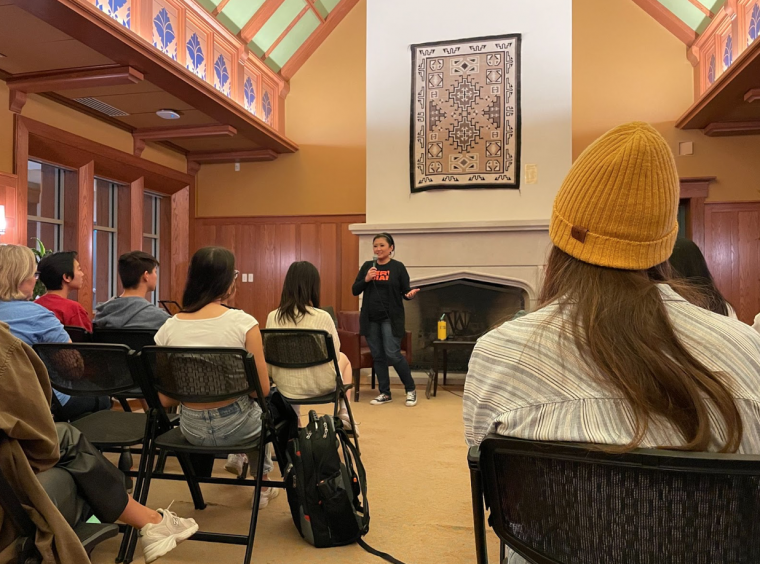News
Emmy winner discusses Asian American experience

Photo by Amanda Young.
Michelle Li was best known as a St. Louis news anchor and reporter for KSDK Channel 5 with multiple Emmy, National Murrow, and Peabody awards when #VeryAsian went viral. Since then, she has started a nonprofit organization called Very Asian Foundation, where she works to amplify and expand Asian stories and experiences through representation and inclusion.
Li spoke to a room full of guests in the DUC’s Goldberg Formal Lounge about her journey, discussing the origin of the hashtag and other topics surrounding Asian American identity, journalism, and her foundation, on Nov. 4.
When Li shared on a New Year’s Day segment that she ate dumplings to celebrate the holiday, a caller took offense, complaining that Li was “being very Asian…she can keep her Korean to herself.”
Li recorded herself listening to the voicemail and shared it on social media. Immediately, people across the country started using #VeryAsian to share pictures of their families, multicultural dinners, and celebrations. To Li, being #VeryAsian means “being able to bring your full humanity to spaces.”
She received messages from people around the world who shared that they never felt Asian enough to be recognized as such because they were adopted, multiracial, or had other layers to their identity. “I think that to have maybe an adoptee in the Midwest be this representative voice for an Asian American ‘Very Asian movement’ was impactful to people,” Li said.
A couple of weeks after going viral, Li was a guest on The Ellen DeGeneres Show. There, she received $15,000, which she put toward the establishment of the Very Asian Foundation.
The mission of the organization is to “shine a light on Asian experiences through advocacy and celebration.”
“I think that’s really important because shining a light is what journalists do,” Li said.
The Very Asian Foundation is currently working with We Need Diverse Books on The May Book Project, meant to help schools and libraries build collections of Asian American youth literature to increase representation in the classroom. The project was initially launched by the Asian American Civic Scholars in St. Louis, but the high schools they contacted turned them down.
“They were really disappointed by that because it felt like they were invisible in the places where they needed to be seen. You rely on your school to see you,” Li said.
She also highlighted the “dual existence” of being Asian American during the COVID-19 pandemic, an experience marked by invisibility and hypervisibility through racial slurs, physical attacks, and “Kung Flu” comments.
Li was invited by WashU China Care, a student group that connects students to Chinese adoptees throughout St. Louis and works to improve the lives of Chinese orphans abroad. Li, who grew up in a rural area near Kansas City, is a Korean adoptee.
“I was the only Asian person in my school. I swore I was the only Asian person in my county,” Li said, though she has “always been really proud of actually being from Missouri and having Midwestern sensibility.”
Sophomore Andrew Wong, a member of China Care’s Advocacy team, said the club brought Li in as a speaker “to educate and inspire the WashU community and the kids we work with on topics like adoption and broader Asian American issues.”
Li shared that she sometimes struggled with her Asian American identity. “I always kind of felt like an imposter in my own skin because I knew that, publicly, I was presenting as an Asian person,” Li said.
However, an interaction with a fellow Asian American who could not speak her native tongue made her realize that everyone has different experiences and understandings of their identities. “I was like, ‘She has never thought [that] she wasn’t Korean because she didn’t speak the language,’ whereas I took all this time to know the language, and here I was thinking I wasn’t Korean enough…in America, we all have to be very intentional about what culture we bring into our lives.”
Sophomore Audrey Brown, a China Care member who serves as a mentor in the one-on-one Chopstix program, resonated with Li’s discussion about Asian American identity. “At the end of the day, no one [is] ever not enough. For instance, there’s no such thing as not being Asian enough, which is something I’ve dealt with as a Chinese adoptee myself,” Brown said.
For Wong, the biggest takeaway was that “There is no perfect Asian.”
“As students with Asian heritage going to school in America, we’re in a unique position of balancing commitment to cultural values with individuality and exploration, and it’s not always easy. Michelle affirmed that there really is no definite way to be Asian: one person’s way of expressing themselves and their culture may be different from someone else’s, and all are equally valid,” he said.
When Li traveled back to Korea, she said she felt a sense of loss: “I’m very glad of who I am. But, I’m also sad that I didn’t experience [Korean culture] and that everything that I try to bring into my life is so learned — like I’m a student of Korean culture, but I’m not really a part of [it].”
Li also spoke about her career as a journalist. “My career has sometimes been hindered because I’m Asian. It’s very rarely been elevated because I’m Asian. People used to say things like, ‘We can’t have two of you at the station because that would just confuse the viewer.’” Li is the first Asian American anchor in 75 years at KSDK.
As a morning show reporter, her workday starts at 5 a.m. and goes until 12 p.m., after which she tackles her to-do list for the Very Asian Foundation. What keeps her motivated is the people involved. “To hear other people’s stories inspires me. It gives me strength and energizes me to know that we have these collective experiences and that we can rely on each other.”
